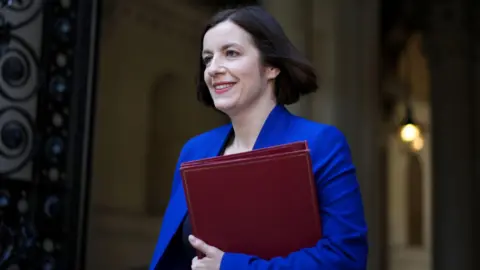The topic at hand delves into the recent discussions by ministers regarding the potential elimination of the two-child benefit cap, a controversial policy that limits means-tested benefits for families with three or more children born after April 2017. Education Secretary Bridget Phillipson candidly expressed that although the government is contemplating the removal of this cap, the fiscal repercussions could be significant. This policy has faced scrutiny for its role in exacerbating poverty among families, an issue which has become increasingly urgent in the political arena.
According to Phillipson’s statements made during her interview with the BBC, the current cap imposed on child benefits effectively constrains access to financial support for families in need. By limiting benefits to the first two children, the policy has unintentionally pushed many families deeper into financial hardship, contributing to a rise in child poverty rates. As the government prepares to unveil its child poverty strategy in the autumn, it aims to reassess this policy to propose a more equitable solution.
Furthermore, Phillison compartmentalized the challenges that come with altering the existing social security framework, highlighting that a shift away from the cap is not straightforward. The anticipated announcement comes amid heightened scrutiny from various political factions, including the Labour backbenchers, who are pressing for reforms given the dismal performance of their party in recent local elections. Criticism from figures within the Scottish National Party (SNP) and calls from some Labour MPs have amplified since the government instituted the cap. The urgency to address child poverty has become a focal point for policy reform discussions.
Phillipson and her colleague, Work and Pensions Secretary Liz Kendall, are spearheading the Child Poverty Taskforce, which has been working on this pressing strategy since its inception last year. Initially slated for publication in the spring, the strategy’s release has been postponed to the autumn, adding more weight to the expectations surrounding the government’s plans to tackle the persistent issue of child poverty.
Labour’s manifesto for the upcoming 2024 elections includes a commitment to abolish the cap “when fiscal conditions allow,” reflecting their intent to pivot from current policies that limit support for larger families. Phillipson indicated during her interview that the taskforce is examining all aspects of the cap, assuring constituents that no option is off the table in the quest for improved social security measures. She stated emphatically that a Labour government would never have instituted such a cap, alluding to fundamental ideological differences between her party and the Conservatives.
Conversely, Conservative shadow chancellor Mel Stride defended the cap, asserting that many families make conscious choices regarding the size of their households, and it is reasonable to have limits on benefits provided to households reliant on government support for additional children. Stride’s comments reflect the prevailing belief within the Conservative Party that fiscal responsibility must also take precedence in discussions around welfare provisions.
The implications of the two-child benefit cap are stark, as approximately 1.6 million children live in households impacted by the restriction. The Resolution Foundation, a prominent think tank, has projected that abolishing the cap could incur costs of around £3.5 billion but would significantly benefit children’s welfare by lifting approximately 470,000 children out of poverty. This compelling data underscores the complexities of welfare reform and the substantial effect it could have on alleviating child poverty in the UK.
As political parties prepare for the forthcoming elections, the discourse surrounding the two-child benefit cap is not merely a policy discussion; it encompasses broader themes of social equity, economic responsibility, and the significance of children’s rights within governmental frameworks. The outcomes of these discussions could fundamentally reshape the landscape of financial support for families across the United Kingdom, highlighting the pivotal role of policy reform in addressing child poverty in a time of growing economic uncertainty.



